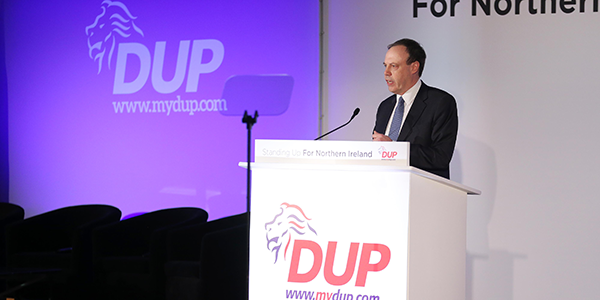Matters of consent: the Withdrawal Agreement does not violate the Good Friday Agreement
John McGarry and Brendan O’Leary write that, contrary to the DUP’s claims, the draft Withdrawal Agreement does not violate the provisions of the Good Friday Agreement when it comes to consent. Instead, the proposals regarding Northern Ireland are reasonable and balanced.

Conference 2014 – Nigel Dodds. Picture: DUP Photos/(CC BY-NC-ND 2.0) licence
Many criticisms have been made of Prime Minister Johnson’s draft Withdrawal Agreement with the EU, but the most inaccurate is the claim that it ‘drives a coach and horses through the provisions of the Good Friday Agreement’ (GFA). The claim has been made by the DUP’s Westminster Parliamentary leader, Nigel Dodds; his colleague, Jeffrey Donaldson MP similarly maintains that the consent principle of the GFA is ‘not adequately’ reflected in the draft agreement. Since Donaldson walked out of the Good Friday negotiations on the morning they were concluded, and Dodds vigorously opposed it, they are perhaps not the most credible sources on the legal facts of that Agreement.
Sadly, however, the ‘coach and horses’ claim was first made by Jonathan Powell, a man with far greater standing in these matters, as Tony Blair’s former chief of staff, and to whom an extraordinary debt of gratitude is owed for the eventual implementation of much of the GFA. Powell’s complaint is that Johnson has driven the said coach and horses ‘by allowing a simple majority to decide whether [Northern Ireland] stays in the single market and customs union.’
Matters of consent
We disagree with Powell, respectfully. The law on these matters is not contestable. Properly understood, the consent principle included in the Good Friday Agreement requires that whether Northern Ireland re-unifies with Ireland, or remains in the UK, is to be decided by a majority of the people of Northern Ireland. UK legislation provides that the majority will is to be expressed in a future referendum. That is the consent-to-sovereignty principle. A simple majority suffices.
If one believes, incorrectly, that the so-called ‘frontstop’ arrangements proposed in the new Withdrawal Agreement modify the sovereign status of Northern Ireland, then the correct procedure would be to have a simple-majority referendum on whether Northern Ireland accepts these arrangements.
But, if one thinks, correctly, that the proposed arrangements do not alter the sovereign status of Northern Ireland, then the question is whether the ‘cross-community consent’ procedures set out in the Good Friday Agreement (Strand One: Safeguards), and incorporated in the Northern Ireland (1998) Act, should apply to these arrangements.
Contrary to what Jonathan Powell suggests, and the DUP insists, no such constitutional or legal requirement is in order. That is because the functions concerned – namely, customs, EU single market regulation, and VAT – are not Northern Ireland Assembly or Executive functions, under the GFA, or the NI (1998) Act, or the treaty between the UK and Ireland annexed to the GFA. Therefore, as a matter of law, in the absence of statutory changes in UK law, or jointly agreed changes to the GFA and the treaty, these functions are not subject to cross-community consent procedures.
Customs, EU single market regulation, and VAT are ‘reserved’ or ‘excepted’ matters in UK constitutional terminology, and therefore the Westminster Parliament may legislate in these domains without contravening UK law, the GFA, or the treaty that protects it.
Why there is a Revised Protocol for Ireland & Northern Ireland
As most people understand, the proposed future management of customs, single market regulation, and VAT have been negotiated because the EU, the UK, and Ireland seek fully to preserve key features of the Good Friday Agreement. The most obvious of these is the assumption, at the time the agreement was negotiated, that the joint membership of the EU’s customs union and single market by the UK and Ireland would enable a ‘border-less’ Ireland.
All who have been paying attention know by now that a land border without functioning physical infrastructure did follow after the de-militarisation of Northern Ireland. That could not have happened without the success of the peace process wrapped up in the GFA – in which Jonathan Powell played perhaps the most significant role on the British side.
Johnson has now conceded, through the frontstop, that he must protect the GFA in all its parts, and he has abandoned his previous claim, which is still quoted in the opening of each episode of Ireland’s most famous podcast series, ‘Brexit Republic’, namely, that ‘the particular problems around the Irish border are being used politically to frustrate Brexit.’
No one disagrees that Johnson has made concessions, and performed multiple about-faces, to secure the UK’s exit from the EU with a withdrawal agreement. And no doubt there is good cause to suspect each of his maneuvers. But the new arrangements do not violate the GFA – at least not yet.
The Sewel Convention – a veto power?
‘Consent’ may, however, be thought to arise in one other sense: if the EU Withdrawal Bill, and other legislation implementing the Withdrawal Agreement, were to change the powers of the Northern Ireland Assembly and Executive.
The UK Supreme Court, however, has unanimously insisted that ‘the Sewel convention’ that Westminster consult the devolved legislatures before changing their powers is just that – a convention. That is, no veto rights are held by any of the devolved legislatures over Westminster legislation – even if their powers are modified. That is regrettable, but it is the legal status quo.
The special opt-out for Northern Ireland
What the UK and Irish governments have decided, through the Withdrawal Agreement, is to allow the Northern Ireland Assembly to opt-out of the envisaged changes, after four years, albeit with a delayed effect of a further two years. The UK was not required to propose this idea under the terms of the GFA. Indeed, the idea of providing any role for the Northern Ireland Assembly was initially a concession to the DUP. But that party, it should not be forgotten, initially sought a wholly unacceptable minority veto, one with no foundation in the GFA. Indeed, EU negotiators were astonished at what the DUP sought.
The DUP’s unreasonableness
Despite the fact that Northern Ireland had voted decisively in favour of Remain in the 2016 referendum, the EU-27 were asked to accept that a minority in a regional Assembly – one that had not been functioning since February 2017 – should have the right to decide on the whole Withdrawal Agreement, and the subsequent maintenance of the ‘frontstop’. This veto was demanded, despite the fact that no consent from the Assembly was sought (or would have been forthcoming) to the entire UK’s exit from the EU. It was demanded even though the DUP had no objections on ‘consent’ grounds when the UK government triggered Article 50 of the Treaty on European Union, against the preferences of a majority in Northern Ireland.
The EU, the UK, and Ireland have not breached the GFA in order to save it – what the DUP is in effect suggesting. Rather, what the EU, the UK, and the Irish government have proposed is something very reasonable and balanced. They have agreed that the Northern Ireland Assembly should have the right to opt-out of the arrangement in the draft Protocol, after a period of four years’ experience and reflection, by simple majority resolution. And, by cross-community consent, the Assembly may agree to extend the arrangements for a longer interval, eight years.
Should the Northern Ireland Assembly be functioning, this new provision gives no veto to unionists or nationalists. That is because both are now minorities. Instead, the provision gives the ‘others’, those who do not register as unionists or nationalists in the Assembly, a pivotal role in future decisions on this matter. A majority to opt-out, or to stay, can be achieved by support across all three groups, or by the others aligning with either nationalists or unionists. That seems reasonable to us. And, if there is widespread, i.e. cross-community consent to continuing the new arrangements, then they can be extended for eight years – very helpful planning horizons for producers and consumers.
Those who object to Johnson’s draft Withdrawal Agreement may want to say that cross-community consent should be required for changes of such significance, and that that would be in keeping with the ‘spirit’ of the GFA, if not its precise texts. We have good reason to think that is how Jonathan Powell wishes to be understood.
But consistent application of this idea would rule out the DUP’s proposed alternative to the Withdrawal Agreement, which is to withdraw the UK fully from the EU customs union, with no de facto participation of Northern Ireland. That idea is not only unacceptable to Irish nationalists in Northern Ireland, but to a majority of its people, and businesses.
The DUP’s self-entrapment
The DUP is impaled on logical contradictions; the sole consistency in its positions has been that it wants a veto. Lest that be considered uncharitable, consider the following. The DUP insists on cross-community consent for Northern Ireland to stay (effectively) within the EU’s customs union, but rejects applying the same idea either to the UK seceding from the entirety of the EU, or simply from its customs union. It should be easy to see that, by whatever measure of consent one chooses, simple majority, or cross-community, the DUP’s stance breaches the spirit of the GFA more than anything in the draft Withdrawal Agreement.
The easiest way to address the aspirations of the two principal communities in Northern Ireland, would have been for the UK to remain within the European Union. It still is. That would have assured Irish nationalists in Northern Ireland there would be no physical border between them and Ireland, and unionists that there would be no regulatory, customs or fiscal border between them and Great Britain. The DUP emphatically rejected that, however, and went with the majority in England and Wales against the majority in Northern Ireland and Scotland.
A compromise proposal emerged in Theresa May’s ‘backstop’, which would have kept the UK as a whole within the EU customs union, and Northern Ireland in regulatory alignment with the EU, until such time as (magical) technologies finessed the attendant difficulties, or a future treaty between the UK and the EU resolved the same difficulties. The DUP warmly favoured the magical technologies, and indeed claimed that they existed already, but otherwise the party rejected the backstop on the same grounds as the Conservative ‘Spartans’, because it potentially kept the UK inside the backstop sine die. Now, of course, they reject technological solutions to exit declarations on goods going from Northern Ireland to Great Britain.
Another compromise proposal has been offered by the Labour party. It proposes staying in the EU’s customs union, or the equivalent, and, in effect, also favours substantial alignment with the Single Market, which would obviate the need for hard borders in the Irish Sea and across Ireland. The DUP has not, so far, followed this option.
What the DUP did, however, to the astonishment of many, was to accept the idea of two hard borders – a regulatory border between Great Britain and Northern Ireland, and a customs border across Ireland. This bizarre idea was a compromise, for the DUP with the Johnson government, but manifestly against any objective assessment of the interests of Northern Ireland, and it would have been bad for all.
But having seen the DUP move on the location of one border, Johnson knew it was more flexible than it had suggested, and effectively agreed with Ireland and the EU to put all the effective borders in one locus, at ports and airports, and none on the land border across Ireland. We are not being rude when we point out that this final move returns us to something very close to the original backstop, which the DUP rejected, obliging Theresa May to devise another, one that proved to be her undoing.
The DUP has therefore made its own predicaments. Had it played its cards differently it could, today, be celebrating how it negotiated to get Northern Ireland the best of both worlds – the best of the EU and the best of the UK. Instead it finds itself outplayed, claiming imaginary violations of an agreement which it had sought to strangle at its birth in 1998. In due course we shall see what its voters think.
This articles gives the views of the authors, and not the position of Democratic Audit. It was first published on the LSE British Politics and Policy blog.
About the authors
Note: The authors have written widely on the Good Friday Agreement, notably in their The Northern Ireland Conflict (Oxford University Press: 2004).
John McGarry is Canada Research Chair in Nationalism and Democracy at Queen’s University, Canada.
Brendan O’Leary is Lauder Professor of Political Science at the University of Pennsylvania, USA. O’Leary’s A Treatise on Northern Ireland (Oxford University Press) was published in 2019, and reviewed here.







 Democratic Audit's core funding is provided by the Joseph Rowntree Charitable Trust. Additional funding is provided by the London School of Economics.
Democratic Audit's core funding is provided by the Joseph Rowntree Charitable Trust. Additional funding is provided by the London School of Economics.